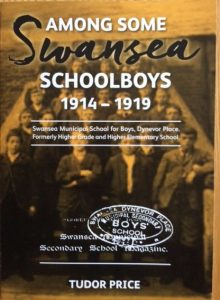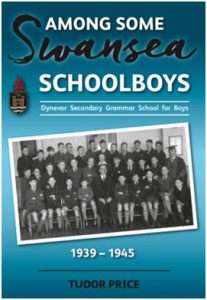The History of Dynevor School
Dynevor School first opened its doors to pupils in the Autumn Term of 1883, on its former site of Trinity Place – a site long disappeared under the Orchard Street multi-storey carpark. The original 100 boys were taught by the headmaster, Mr. Gomer Jones, assisted by a staff of four. Mr. Jones only held the position for a term before he left to join the Inspectorate. It was left to his successor and longest serving headmaster, Mr. Samuel Roberts, to lead the school in its first formative years.
The school flourished and in 1894 moved to the larger site in Dynevor Place with accommodation for 500 pupils. Formal recognition as a Municipal Secondary School came in 1907 and the school began to take on grammar school status.

The school’s third headmaster, Mr. W. A. Beanland, took the helm in 1911 and supervised the expansion of the site. This finally occurred in 1929 when the Dynevor Place and De la Beche Street premises were extended. The latter were occupied by De la Beche Girls’ School under the headmistress, Miss Naylor. The school was now the fine structure that is the background image of the home page of this site. In that year the fourth headmaster was appointed, Mr. Llewellyn John.
The following year, 1930, the school changed its name from Swansea Municipal Secondary School to Dynevor School and the Old Dy’vorians Association was founded.
In the ensuing decade Dynevor consolidated its position as one of Swansea’s foremost secondary schools. Then, in February 1941, the school became a victim of Germany’s 3-night blitz of Swansea’s town centre. The roofs of both buildings were gutted by incendiary bombs, rendering the top floor uninhabitable until 1959.

The ensuing accommodation difficulties resulted in the sharing of facilities between Dynevor and the nearby Grammar School and the transfer of the De la Beche girls to release what was left of their building for use by Dynevor. During these times, Mr. W. Bryn Thomas replaced the retired Mr. Llewellyn John in 1942. Two years later the school adopted the name Dynevor Secondary Grammar School.
In 1952, Mr. Glan Powell, a past pupil and member of staff, became headmaster and his appointment coincided with the commencement of the rebuilding of the top floors of both wings. This work continued under Mr. Meredydd G. Hughes who took up the reins in 1957 and supervised the provision of a new assembly hall and library.
Mr. D. Bernard Norris, again a former Dynevor pupil, was appointed headmaster in 1965, and was responsible for leading the school through the transition to a senior comprehensive school in September 1971. In September 1978 further changes took place when Llwyn-y-Bryn Girls’ School amalgamated with Dynevor to become the new Dynevor Comprehensive School.
As the school’s centenary approached the leadership of the school changed hands again and. in 1979, Mr. W. D. Hubert Davies became the school’s ninth headmaster. All his predecessors had each been identified with an historic change in the structural or educational development of the school and Mr. Davies’ stay was no exception. The high spot of his period must surely be the school’s centenary but, with the advent of tertiary education in the same year, the phasing out of the school’s sixth form began.
In 1986, although he did not realise it at the time, Mr. Allan Smith became the final and third longest serving headmaster of the school. His 15 year tenure saw, as a result of educational policy, an inevitable decline in pupil numbers. It then became his unenviable task to supervise and co-ordinate the transfer of Dynevor’s pupils to the site of the former Dillwyn Llewelyn Comprehensive School for the creation of the new Dylan Thomas Community School, in 2001. Educational facilities remained on the Dynevor site for a further year while Year 9 and Year 11 pupils completed their studies and exams. Then, at the suggestion of the Old Dy’vorian Association, on Wednesday 24th. July 2002 past pupils and masters were invited back for a last farewell before the doors were finally closed.
This brief historical account has recorded the many changes that have occurred throughout the school’s 119 years of existence. It is obvious that the trauma of these changes never deviated the staff or pupils in their opinion that Dynevor was a school with great traditions and the finest school in Swansea.
This account, and the list of key dates in the history of the School, was compiled by Dave Tovey (Class of ’52) from the 75th Anniversary and Centenary School Magazines published in 1958 & 1983.
“The Vanished Swansea School”
The feature “The vanished Swansea school with a quite remarkable list of former pupils” is reproduced with the permission of the author, Senior Reporter Nino Williams of the South Wales Evening Post/Wales Online. It was also published online on 24 February 2019.
Please CLICK HERE to read more.